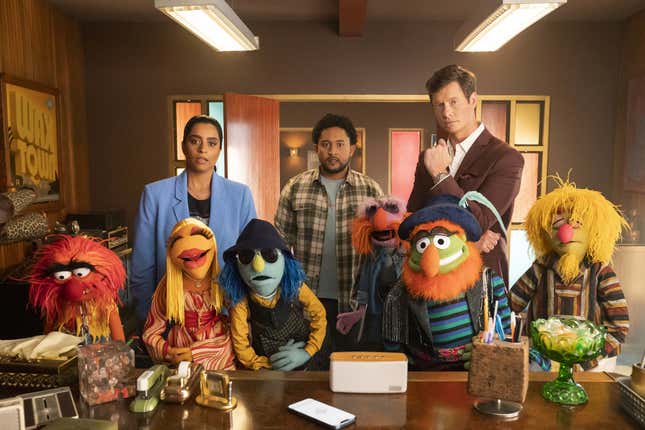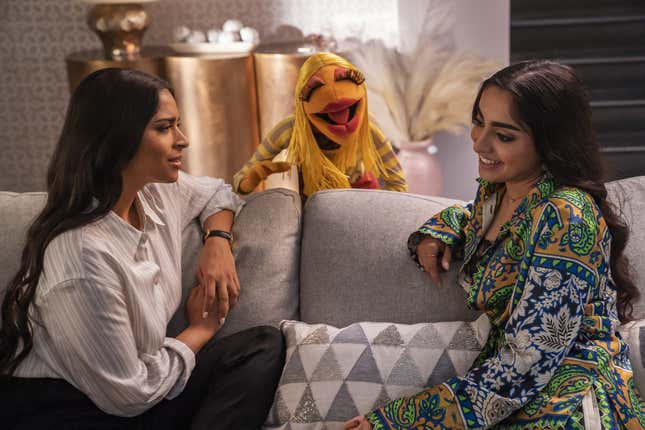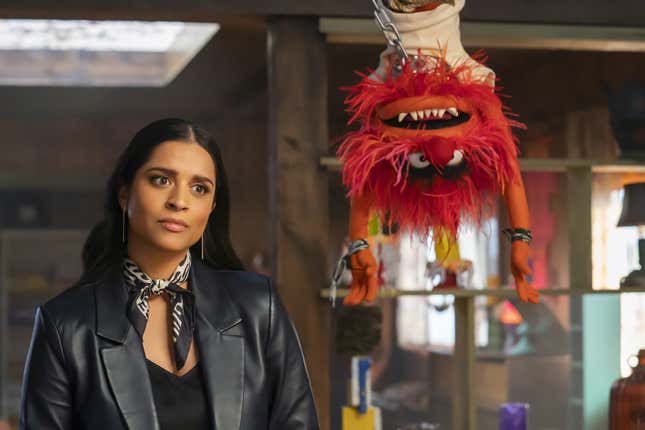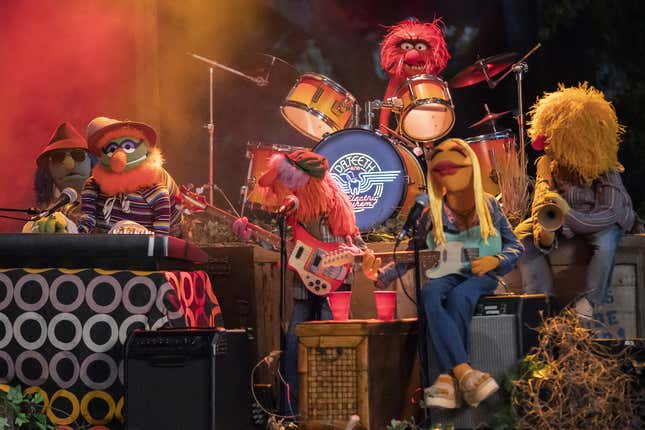موقع شبرون للتقنية والأخبار- متابعات تقنية: [ad_1]
The Muppets are back! But this time, it’s not the usual Muppets starring in a new Disney+ series. Instead, The Muppets Mayhem focuses on the members of the Electric Mayhem band—the house band on The Muppet Show, made up of beloved side characters Dr. Teeth, Floyd, Zoot, Lips, Janice, and Animal.
io9 talked with co-creators Adam F. Goldberg (also an executive producer), Jeff Yorkes (co-executive producer), and Bill Barretta (he plays Dr. Teeth and is also an executive producer) all about The Muppets Mayhem, which follows the characters as they hit pause on their long-running tour and attempt to record their very first album. Chaos ensues, as does a lot of soul-searching—and plenty of groovy rocking out.
Cheryl Eddy, io9: The Muppets Mayhem is about a band, so there’s tons of music in it. Some is original, but there’s a lot of famous songs—you even have a fourth-wall break about a certain song being too expensive to license. What approach did you take, deciding what songs you wanted to be in there?
Jeff Yorkes: Deciding the songs was the fun and the easy part—you get to pick and choose from every song that’s existed, although we kept it to a certain era, certainly. And it’s easy as a writer to say, “It’s going to be this song. It serves our story here, it serves our characters and our emotions and what we want our audience to feel.” It’s another thing to license it; that was something I didn’t necessarily have to worry about—[that’s why] we have a music supervisor. And it was part of our budget, so they knew going into it that a chunk of our budget for each episode was going to be for music.

20% Off
LEGO Icons Bonsai Tree
A perfect tree
This magical little tree is a lot of fun to build, has a few customizable parts, and never needs watering to keep it alive. You can water it if you want, but it’s not necessary.
Adam F. Goldberg: We got every [song] we actually wanted—and the good news is, [we didn’t] have to pay for performance because our band is performing it. And what’s really funny about that moment you talk about—which is the band wanting to sing “Stairway to Heaven,” is that, famously, there is a joke in Wayne’s World where Wayne starts to play “Stairway to Heaven,” and then a guy [stops him] and points to a sign that says “No ‘Stairway to Heaven.’” He only played one note—and there was some kind of lawsuit where they had to pay for the song, even though he only played one note. So we couldn’t even hear one note of it. That’s why we cut away the minute they open their mouths. So even that bit made the legal department very nervous because there had been a precedent of never using “Stairway to Heaven.” But we were happy that they let us still do the bit.

io9: Another thing that the show has a lot of is celebrity cameos, which is obviously a Muppets tradition. But how did that process work? Did you have a dream list of people you wanted to ask, and just… none of them turned you down?
Bill Barretta: You come up with who you think should be in that scene or that moment, and you hope that you’re going to get them. And historically with the Muppets cameos—you’re almost finishing saying “Muppets” [and the person you want to cameo] says “Yeah, OK!” We found ourselves in a situation because the world was kind of coming out of covid as we started our show, and a lot of our musical cameos that we were hoping for were going on tour—so it was tricky getting those folks. As for our other actor cameos, some were friends who were excited to be a part of it. Danny Trejo—he’s a guy that if I can, I will put him in everything. But generally, everybody was on board. They wanted to come and play with the Muppets.
io9: Prior to this series, we didn’t know too much about the backstories of most of these characters. Did you have totally free rein to kind of explore that, or were there any boundaries or guidelines given to you?
Barretta: For the most part, it was open to for us to find things and then run that by a few people, like the folks at the Muppet Studios, just to make sure that they were okay with certain aspects of it or or not.

Yorkes: It was definitely one of the draws for us as writers. We had—not free rein, but because these characters were sort of known and there wasn’t too much known past that, we could develop it. But then when we started working, we had Bill, and we had access to the performers who had their ideas, as performers who have living with these characters for a long time. And it was just an interplay: “Hey, this is something we were thinking, what do you guys think?” that was really collaborative.
Goldberg: The only parameters for Jeff and I were, “Will the performers sign off?” That was a newer approach. Jeff and I really wanted to have Bill be a co-creator with us on the show because then you have Dr. Teeth in the room with you—and also Bill has decades of relationships with all the other performers. So for us, it wasn’t—you know, if Muppet Studios had an issue, of course, we would want to make them happy. But for us, it was really about these performers who embody these characters, and we wanted to give them backstories that they approved of. So that was was all we cared about.
Yorkes: Yeah, but it would be like… the nerve of us to go in and just be like, “This is what you’re doing. We wrote this for you and your character.” We couldn’t even imagine.
Goldberg: Saying that to [Muppets legend and Zoot performer] Dave Goelz, who’s been doing it, you know, for 100 years. From the beginning.
io9: Did you know from the start that this was going to be a show just about the Electric Mayhem, without having Kermit or Miss Piggy or Gonzo or anyone stop by?
Goldberg: When Jeff approached me with this idea of doing a Mayhem [project], it was initially a movie. And then I said, “Let’s make this as a show.” But Jeff, Bill, and I have very lofty dreams that Disney starts this Muppetverse where it’s just like Marvel or Star Wars, this web of movies and specials and animation. We would love to to help them do that. But if you’re going to do that—they started just with Iron Man, right? So for us, it was like, we’re just doing a show about the band; let’s focus on this one very specific corner of the Muppet Universe. Let’s show Disney and the audience there’s whole backstories here and we just want you to fall in love with this band. Let’s not worry about anybody else. And from there, let’s now kind of branch out and do even more. So that was always our idea. In fact, we were kind of more excited about introducing new Muppet characters. That was always a goal for us.
Yorkes: We consciously chose not to include the other Muppet characters. We want to make this about the band—that they can do this on their own. They wouldn’t be saved by the other characters. It might be nice if you see one or two, but let’s not do it in such a way that it didn’t feel organic to the story.

io9: We do meet some new Muppet characters, but Muppets Mayhem takes place in a mostly human world. Was that more of a practical decision? Did you ever want to make the cast more evenly divided between humans and Muppets?
Barretta: No—we just wanted, again, to focus on the band and put them in the real world so you can believe, if you choose to as an audience member, that they really exist. Just like the Muppets always have been. And holding back on other Muppets was definitely a choice. At one point we had an idea that Kermit and Piggy might be [make an appearance], but that just felt like too much. We didn’t really need to go there. And we used other Muppet-like things, like the bunnies. It just felt right because it applied to Animal’s character; it’s something that Animal’s always had. He’s always loved bunnies, and that’s always been a sweet thing with him. But we really tried to consciously hold back and let [the band] shine rather than [bringing in other Muppets to distract from them].
Goldberg: And I think for me, it’s a tone thing that the Muppets, this band, they’re in the real world … We really want to show the audience and Disney, these are actual characters that are—even though they’re puppets, and are made of felt, they are real. They’re like real people, real, breathing entities that can be in the real world. That’s a take that makes me a little nervous because it’s more grounded. It’s not going to be so wacky and zany and cartoony. And I love when Muppets are like that; my favorite Muppet joke of all time is the “fork in the road” from The Muppet Movie. But in this show, we wouldn’t do that because we really wanted to make this like, the band is trying to make it in the actual music business.
Barretta: Some of the notes that we got from Disney+ were, “Wow, they feel like real people. They’re really going through that emotion.” It was almost like they didn’t expect it. They expected it to be more surface-y. And we just didn’t want to do that. We wanted to get, you know, deeper, more three-dimensional with them.
io9: I was going to ask you about notes from Disney+, but specifically about—well, the show is obviously very family-friendly but there are a few cheeky drug references and even a whole “trippin’ in the desert” sequence after the group eats some “expired marshmallows.” Did you face any pushback regarding any of the content?
Goldberg: There was pushback from Jeff [Jeff laughs] because I think Jeff had the right spirit, which is we want to watch this with our kids, right? Sometimes when you’re in a writer’s room and everyone’s very funny, something edgy comes out. And I really appreciated that Jeff was like, “That’s not what I want to watch with my kids.” So I think it was actually more from us, self-censoring than Disney+ or Muppets Studios being like “that’s inappropriate.”
Barretta: And the Muppet performers pushed back on our 4/20 references and things like that, that we had. They just felt like it wasn’t necessary and it was going to be a little bit of an easy, easier joke, you know.

Yorkes: And [the marshmallows were] accidental, right? They weren’t necessarily, like, “Hey, here’s a marshmallow that’s going to make you trip, let’s eat it!” It was an accident. That was one of the story ideas from the beginning I wanted to do. And I had all this ammo in my arsenal of just like, ready to fight back, if they were going to push back. But they were fine with it.
Goldberg: It’s interesting, because I think because there’s puppets, you think this is going to appeal for kids, right? I mean, that’s why the Muppets are timeless, because it should appeal to adults and have that kind of comedy that speaks to adults. But it’s brightly colored, lovable puppets, so it’s for kids as well. There’s a meme that’s out there that I just love. Willie Nelson has performed with the Mayhem band a number of times, and the meme is “Willie Nelson looks like the least high person in this photo.” [Everyone laughs] And I think the performers are right in a way; there is this kind of hippie jam band vibe to them, that they are kind of tripped out at all times. There is an adult kind of vibe to the show naturally, because they are—just their design, their eyes are all closed, you know. Dr. Teeth [and Animal’s] eyes are open, but we got Janice, her eyes are closed. Zoot’s wearing the glasses. Lips, his eyes are closed. Floyd doesn’t even have eyeballs. There’s a very blatant subtext to the band, [so we] just let it be implied. We didn’t have to say anything.
Barretta: These characters were created in the ‘70s, by people who were living in the ‘70s and living that life. That’s that’s where they come from, so I think they’ve always walked that line of “just be careful where you’re going, so that everybody can enjoy them.” I think we found a way to explore their characters more and find more joy at the heart, so that you’re not just always thinking they’re band that’s high. They’re much more than that.
Yorkes: But I will say, I think the tone of the show was, we wrote it for us, you know, just to make us and our friends laugh, and all the people who grew up with the Muppets—but also made it accessible so that we could show our kids.
The Muppets Mayhem arrives May 10 on Disney+.
Want more io9 news? Check out when to expect the latest Marvel, Star Wars, and Star Trek releases, what’s next for the DC Universe on film and TV, and everything you need to know about the future of Doctor Who.
[ad_2]



